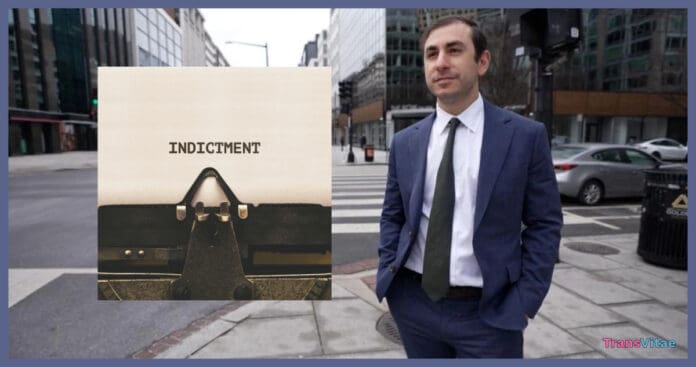After receiving an indictment on four counts of wrongful disclosure of personally identifiable health information by a federal grand jury, Houston surgeon Eithan Haim, 34, finds himself in the middle of a legal storm. This development follows allegations that Haim leaked private patient information from Texas Children’s Hospital to conservative activist Chris Rufo. The indictment, which was unsealed on Monday, reveals the serious implications of Haim’s actions and the potential consequences he faces.
Haim, who completed his rotations at Texas Children’s Hospital during his residency at Baylor College of Medicine, allegedly accessed the hospital’s electronic system in April 2023 without authorization. According to the U.S. Attorney’s Office for the Southern District of Texas, Haim retrieved sensitive patient information, including names and attending physicians, with the intent to cause harm to the hospital. The charges come in the wake of an FBI investigation into Haim’s conduct, which has garnered significant attention and controversy.
The incident underscores the critical importance of safeguarding patient privacy and adhering to the Health Insurance Portability and Accountability Act (HIPAA). HIPAA is designed to protect individuals’ medical records and other personal health information, and violations of this law can result in severe penalties. If convicted, Haim faces up to 10 years in federal prison and a $250,000 fine for each count of wrongful disclosure.
His collaboration with well-known conservative activist Chris Rufo complicates the controversy surrounding Haim’s actions even more. Rufo, who has gained notoriety for his critiques of critical race theory and gender-affirming care, published an article in May 2023 accusing Texas Children’s Hospital of continuing to provide gender-affirming care to minors despite public statements to the contrary. Haim was initially identified as an anonymous whistleblower in Rufo’s piece, but later revealed his identity in an interview, positioning himself as a moral crusader exposing unethical practices.
However, it appears from the U.S. Attorney’s Office’s indictment that Haim’s actions were more motivated by a desire to harm the hospital than by a sincere concern for the welfare of the patients. Assistant U.S. Attorney Tina Ansari, who is prosecuting the case, emphasized the gravity of the allegations, stating that Haim’s unauthorized access and disclosure of patient information constituted a serious breach of trust and privacy.
Haim’s attorney, Marcella Burke, has vigorously defended her client, arguing that he acted as a mandatory reporter of child abuse and was morally obligated to disclose the information. Burke contends that the charges against Haim are politically motivated, reflecting broader tensions surrounding transgender healthcare and conservative activism. She has also criticized the lack of transparency from the government, noting that Haim has not yet received formal indictment paperwork.
The broader context of this case includes Texas’s legislative actions regarding gender-affirming care. In recent years, state lawmakers have passed legislation, such as Senate Bill 14, which bans certain gender-affirming treatments for minors, including puberty blockers and hormone therapy. This legislative landscape has created a contentious environment for healthcare providers and transgender individuals, further complicating the ethical and legal dimensions of Haim’s case.
Haim’s supporters, including Rufo and other conservative figures, have framed him as a whistleblower heroically exposing malpractice. However, experts and advocates for the transgender community argue that his actions have caused significant harm. Leaking identifiable health information not only violates HIPAA but also risks the safety and well-being of transgender patients, who are already vulnerable to discrimination and harassment.
Carmel Shachar, Assistant Clinical Professor at Harvard Law School, highlighted the dangers of Haim’s actions, explaining that the leaked records were not properly anonymized and could lead to the identification and targeting of transgender children. This potential for harm underscores the necessity of stringent privacy protections and the ethical responsibility of healthcare professionals to uphold these standards.
The implications of this case extend beyond the immediate legal consequences for Haim. It raises critical questions about the balance between whistleblowing and privacy, the responsibilities of healthcare providers, and the impact of political activism on medical ethics. For the transgender community and their allies, this case is a stark reminder of the ongoing challenges they face in accessing safe and affirming healthcare.
In defense of himself, Haim has claimed that his motivation was a desire to safeguard children and expose what he saw as wrongdoing. However, his decision to collaborate with a controversial figure like Rufo and bypass appropriate reporting channels, such as the Texas Medical Board or the Texas Department of Family and Protective Services, has drawn widespread criticism. These agencies are designated to handle allegations of medical or child abuse, ensuring that concerns are addressed through proper legal and ethical procedures.
As Haim prepares for his trial, the transgender community and their supporters are closely watching the proceedings. The outcome of this case will have significant implications for patient privacy, the integrity of the medical profession, and the broader struggle for transgender rights and healthcare access.
The Bottom Line
Haim’s case serves as a cautionary tale about the potential consequences of breaching patient confidentiality, even in the name of whistleblowing. It underscores the importance of adhering to legal and ethical standards, particularly when dealing with sensitive and vulnerable populations. The transgender community, in particular, relies on the trust and professionalism of their healthcare providers, and any breach of this trust can have profound and lasting impacts.
The indictment of Dr. Eithan Haim for wrongful disclosure of private health information highlights the complex interplay of medical ethics, legal obligations, and political activism. As the legal process unfolds, it will be crucial to ensure that justice is served while also safeguarding the rights and privacy of transgender patients. This case is a sobering reminder of the importance of protecting vulnerable individuals and upholding the highest standards of medical practice.


